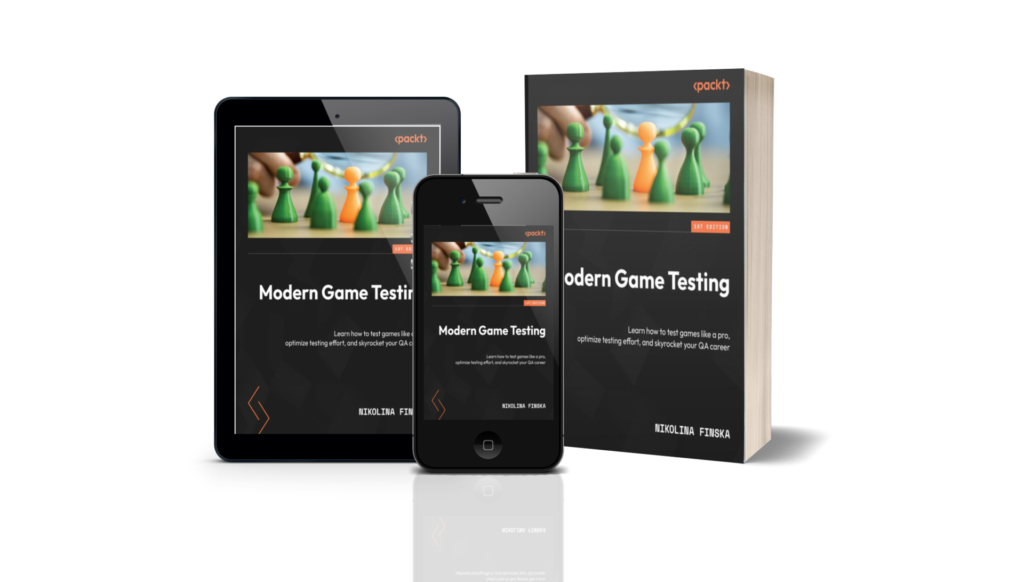5 things I learned working with the book publisher on games QA book


By now, is not a secret anymore that I wrote my first book, “Modern Game Testing” which has been published by Packt. If games QA is your jam, you can order it here: https://packt.link/lCleK Lots of love went into this book and I hope that you will like it as much as I enjoyed creating it!
Writing a book was one of my lifelong wishes. To be completely honest, when I signed up with the publisher while I felt exceptionally proud and excited, I was also terrified. I never worked with a publisher and I didn’t know anyone in my immediate circles who is a published author. I had no clue what to expect and the info I found online was contradicting and confusing. Now, when the book is successfully wrapped up and it has already “hit the shelves”, I decided to share my top five lessons learned from writing it. I hope it will demystify the whole process and encourage the author inside you too!
- Start from the big picture and narrow it down – I always had an idea of writing a book in my head, especially about the topics that I teach and consult about. While presentations and spreadsheets are great, you can hardly get all the nuances of the topic just by looking at the slides. With the book, you can really go into detail and let the reader dwell deep into the topic. But, writing the whole book, while working full time always felt like an overwhelming task. Working with the publisher, this was made so much easier. We started first with the big book idea. When that was flushed out, we then broke it down into main three parts. Each part was then further divided into Chapters. Lastly, in each Chapter, we defined several main topics that will be covered. This divide made the whole process seem more manageable and I had my writing journey fully mapped.
- Your publishing team can make a big difference – I can’t stress enough how grateful I am for my publishing team. They were there to root for me when I felt discouraged, support me when I went through hardships and were always available to explain all the nuances of the publishing process. When we see publishers portrayed in movies and TV shows, there are always breathing at your neck, being pushy and demanding. This has nothing to do with reality. My publisher was understanding, supportive and showed nothing else than kindness and ultimate professionalism, even when I was late with Chapter deliveries. Aishwarya Mohan, Feza Shaikh, and the rest of the team, I can’t thank you enough! Special shoutout to my dear friend, old mentor, and ex-colleague Juha Pomppu who was kind enough to do a stellar technical review of the book.
- Editors are priceless – as a first-time writer, I was really scared getting my first edit back. What if the publisher decides that they made a mistake and I was a horribly bad writer and my texts are beyond fixing? Imposter syndrome hit me really hard. I mean, this was my childhood dream coming true but what if I am really bad at it? Then I got my first edit back, and it was good! Many comments were about how to correctly format the text and suggestions on making complex concepts more digestible to readers. I learned to look forward to editor comments as from each one of them, I learned something new. I strongly believe not only that they made my writing better, but also gave me more confidence to write regularly and not shy away from publishing my works! So embrace yourself, more articles are coming!
- Starting is the hardest part – I won’t lie, there are times when writing is the last thing on your mind. You feel upset, depleted, or just flat uninspired. Early on during the writing process, I would usually stay away from writing on days like those. But then, one day turned into a few and suddenly, I was well behind my writing schedule. I would then start stressing myself that I need to “catch up” and put myself through unnecessary pressure. Through this process though, I noticed an interesting thing: it was much harder to get to writing than writing itself. Usually, when I managed to open my writing files and put the first word on the “paper”, writing would start to flow. There were days when I felt very inspired and could write most of the Chapter in one go. Other times, I wrote only a few sentences and they felt clunky. But, I understood my own mental resistance and how to get through it: just start and it’s going to be OK. This leads me to the final learning which is
- I created a writing habit – as you write while doing other things, I always had to work around my schedule to fit hours for writing. It was something that was always on the back of my mind: how far into writing I am, from which angle I’m going to tackle a specific topic etc. No, I didn’t wake up every morning at 4 am to write before I start the day and I didn’t spend nights writing up when the rest of the household is asleep. But I did develop a habit to write every day. Even if it was only a couple of sentences. Now, when the book is finished, I really missed the process. That’s one of the reasons why I decided to write more, start a blog, and post more frequently on LinkedIn. It would be a shame to let a good habit go to waste!
Nikolina Finska is an author of “Modern Game Testing” book that is now available in Amazon and other major online retailers. She is also available for QA consulting and workshops. For availability and prices please contact info@nikolinawork.com


